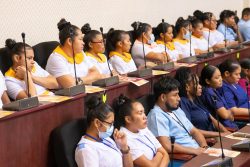The Women and Gender Equality Commission has hit out at the recent ruling of acting Chief Justice Ian Chang which deemed paper committals under the Sexual Offences Act (SOA) as unconstitutional.
In late November, Justice Chang ruled in favour of a challenge to the SOA which declared that paper committal procedures under the SOA were in violation of the constitutional rights of an accused.
According to SOA legislation, no witnesses are required to attend the magistrate’s court to give evidence and the magistrate would make a verdict based on statements provided by the virtual complainant, the investigating rank and the rank who accompanied the complainant to the hospital along with the complainant’s medical report and birth certificate.
However, Chang’s ruling noted that this procedure does not allow the accused the right to cross-examine any witnesses and it was thus deemed unconstitutional as Article 144 (2) (d) of the constitution mandates that every person who is charged with a criminal offence “shall be permitted to defend himself before the court in person or by a legal representative of his choice.” It also implicitly confers on the person charged the right to call witnesses to dispute the evidence adduced or tendered by the prosecution, he added.
In a statement issued on Friday, the WGEC said that it was disappointed and dismayed by the ruling and further said that the fight for justice for women who have been sexually assaulted is under threat thanks to Chang’s decision. WGEC further maintained that the rights of women and men should be upheld under the SOA.
According to the body, a procedure which sought to lessen the number of times a victim is forced to relive the trauma of sexual assault is also under challenge because of Chang’s ruling.
“It is the second time the Constitution-ality of the procedure of paper committals under the Sexual Offences Act is being challenged in the High Court since the Sexual Offences Act came into effect in 2010,” WGEC noted. The group went on, “Women in Guyana who have been sexually assaulted face numerous impediments on the pathway to accessing justice. The Sexual Offences Act improved the process…This hard won battle seems to be under threat once again.”
WGEC further said that the SOA was a “milestone for legislation on rape” that had been worked on by a large group of persons including attorneys, activists and even ordinary citizens and was lauded both regionally and internationally for its provisions.








